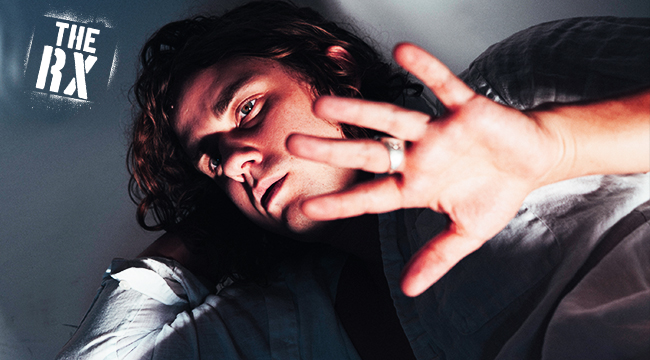
The RX is Uproxx Music’s stamp of approval for the best albums, songs, and music stories throughout the year. Inclusion in this category is the highest distinction we can bestow, and signals the most important music being released throughout the year. The RX is the music you need, right now.
Oh My God. From the lips of drunk sorority girls to the solemn mutterings of the highest religious officials in the land, here is a phrase that moves in and out of the spirit at will. Borrowed at liberty to express surprise or concern outside of spiritual contexts, the ambiguity is part of what makes it a fitting title for Kevin Morby’s fifth solo album, out today, which he’s wryly described as a “non-religious religious record.”
If that feels like too big an oxymoron for any fellow recovering Evangelicals in the audience, try Exclaim’s “secular gospel” distinction, or my own summation, existential blues. (I would go for helplessness blues, but there’s more insouciance in Morby’s slow-drawling, windowpane poetry than there is tender searching). The age-old questions raise their weary heads, and then the dry bones dance, given a mesmerizing new tune to call their own.
Like most artists worth their salt, Morby’s work is shaped and informed by the political elements of his time, and his latest album is an earnest attempt to speak in rebuttal to them. Earlier this month, he talked at length with NPR about how modern tragedies — the police brutality responsible for murders like the one of Freddie Gray, the horror of the Pulse nightclub mass shooting — impacted him enough that he wrote the one-off “Beautiful Strangers” in 2016, and proceeded to donate any profits from the song to the organization Everytown For Gun Safety.
He typifies the track as about “the heartbreak of the world,” and it ends up functioning as a sort of prologue to Oh My God, the lyrics skewered halfway through with a mournful, incredulous string of oh my God, oh my Lords that audiences, and the singer himself, latched onto as a summation of life in America in the late 2010s. It’s an exclamation that’s also a reckoning, and one that might apply to the trajectory of the songwriter himself, too.
Morby, who grew up in Kansas City and had a stint in Brooklyn working as a bassist in the popular psych-folk collectives Woods and fronting the “party band” The Babies before decamping to Los Angeles, seems to have hit upon the kind of inspiration that most artists seek to find in New York City, not upon leaving it. Even his 2013 solo debut, Harlem River, is arguably a love song back to the city he left — but it was only written and released once he’d relocated to LA. Perhaps his flair for wild, technicolor melodies and meandering lyrical style were able to blossom better in the sunshine, but subsequent releases only built up his reputation and — skill level — exponentially, as 2014’s Still Life and 2016’s Singing Saw both fared well on the indie circuits.
Now, when people speak about Morby’s work, they generally point back to the towering 2017 record, City Music, which began to put him on the map as one of the finest lyrical world-builders of our era. And though he was already quickly molting references to those bands of Brooklyn past, on Oh My God Morby has officially amassed a discography of his own that blows anything else he did before out of the water. The year is not even to the halfway mark yet, and it’s still easy to consider Oh My God in the running for the best release of 2019.
Despite the tongue-in-cheek title, the most striking element about Oh My God isn’t the religious undertones. It’s the way the singer-songwriter bends and warps the traditional usage of spiritual sounds to get across his own message, a preacher hijacking the pulpit to spit an entirely different sort of sermon. This one is about individual responsibility and reckoning with privilege — no nail-pierced hands make an appearance, a welcome respite from even some of the more modern hymns of this tradition.
On the album opener (and title track), a playful ragtime piano and the magnificent hum of a choir, combined with Morby’s wandering, husky tenor, begin telling tales of devils and holiness. The specters of Dylan and Lou Reed hover just out of the frame, nodding approvingly. Later, on “Congratulations,” the song begins with a deafening cacophony of children and female voices praying for forgiveness, gaining a sinister edge toward the end, as the child’s voice raises to a scream for pardon, briefly. These eerie vignettes are presented with an air of the surreal, which is more true to life for a passionate religious experience than a secular singer attempting to enter the holy of holies might think.
Easy standouts “No Halo” and “Nothing Sacred/All Things Wild” bleed piano and percussion into a couple of miraculous conversations about aging and joy, the sacred and the profane. “When I was a boy / no rooftop on my joy,” goes the lynchpin line of “No Halo,” and indeed, perhaps the whole album, giving a whole-hearted look at the Morby who once was, and the Morby yet to come. Even if nothing here saves your soul on first listen, it’s very possible multiple listens of Oh My God could save your life. The gospel usually does, whether religion is involved or not.
Oh My God is out now via Dead Oceans. Get it here.






